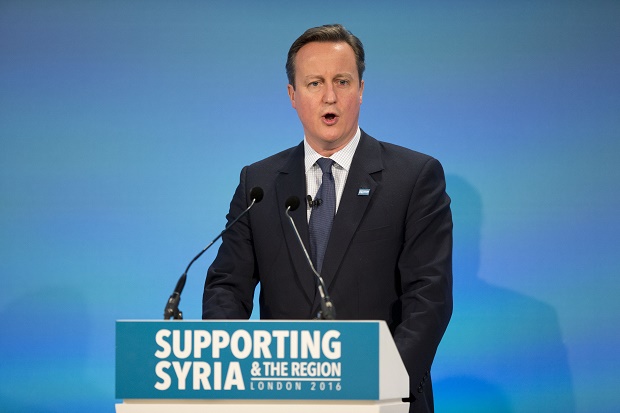Cameron fights for his place in history with EU vote

British Prime Minister David Cameron speaks during the co-hosts press conference near the end of the ‘Supporting Syria and the Region’ conference at the Queen Elizabeth II Conference Centre in London, Thursday, Feb. 4, 2016. AP Photo
LONDON, United Kingdom—Prime Minister David Cameron is playing a high-stakes game which will decide his place in political history with negotiations aimed at preventing Britain from leaving the EU in a looming referendum, experts say.
Cameron landed himself in his current position by promising in 2013 to hold a referendum on Europe if he won the 2015 election. That was a bid to unite his party, long divided on the issue.
Paradoxically for a leader who is arguing for Britain to stay in the European Union, Cameron has described himself as a eurosceptic.
READ: Eurosceptics reject British PM’s EU draft deal
“He is a pragmatic eurosceptic,” Peter Snowdon, co-author of a book about Cameron’s first term in office, “Cameron at 10,” told AFP.
Article continues after this advertisement“He is not Heath, neither Thatcher,” Snowdon said, referring to two of Cameron’s Conservative predecessors, who are seen as more straightforwardly europhile and eurosceptic respectively.
Article continues after this advertisement“He is much more pragmatic, hence his difficulty convincing eurosceptics,” the author added.
Since becoming leader of the centre-right Conservatives 11 years ago, Cameron has insisted that his party must become less focused on Europe, an issue which caused particular splits in the 1980s and 1990s.
READ: UK’s Cameron appeals to Germany to help avoid ‘Brexit’
Cameron proposed the referendum with populist eurosceptics the UK Independence Party (UKIP) gaining popularity and sucking voters away from the Conservatives.
Many analysts believe he called the vote as an attempt to try and resolve the splits for a lengthy period, allowing the Conservatives to move on.
But will the former student of the prestigious Eton College and Oxford University be able to convince Britons to stay in?
‘Benefits for migrants’
Fighting Cameron’s corner will be many business leaders in the City of London as well as the leaders of Scotland, Wales and Northern Ireland who, according to French Prime Minister Manuel Valls, would see a so-called Brexit as a “drama.”
He will also have most of his cabinet at his side. While several are expected to campaign to leave, some key figures are set to weigh in behind him, including Home Secretary Theresa May.
The eventual position of others, including London Mayor Boris Johnson, will be tied up with the leadership race to succeed Cameron, who has said he will step down before the next election in 2020.
The charismatic, mop-haired Johnson has yet to declare whether he will support leaving or staying.
In negotiations, Cameron is sandwiched between European leaders opposed to any change on key principles like the freedom of movement or ever-closer union and a strong strand of eurosceptic public opinion in Britain, fanned by the popular press.
A draft deal for changes to Britain’s relationship with the EU has been published and it could be finalised at a Brussels summit later this month.
“I think he is in a quite difficult political situation, and that is because he made the most specific demands in the area that’s most difficult to convince the other member states to agree and that’s benefits for migrants,” said John Springford of think-tank the Centre for European Reform.
“If he doesn’t achieve it at the summit, he is going to have a very difficult time selling his negotiation to the public at home and also to his own MPs as being some major reform package.”
For columnist Rafael Behr at British newspaper the Guardian, Cameron has learned to negotiate with the EU.
“He was schooled in the art of cramming and to perform well under exam conditions,” he added, referring to the premier’s elite education.
The result of the referendum is likely to go down to the wire, with current opinion polls suggesting a narrow lead for those who want to leave the EU. A large number of voters are still undecided.
The refugee crisis could complicate matters further—with immigration a hot topic in Britain, a fresh wave of new arrivals from Syria and other conflict-hit nations to Europe could make the situation even harder for Cameron.
If Britain votes for Brexit, he would almost certainly have to resign and suffer an ignominious place in history. If he wins, his legacy is sealed.
But afterwards? “He is not somebody wedded to politics, not like Margaret Thatcher. He is very evenly balanced. He was very candid, very open, about the importance of his family,” said Snowdon.